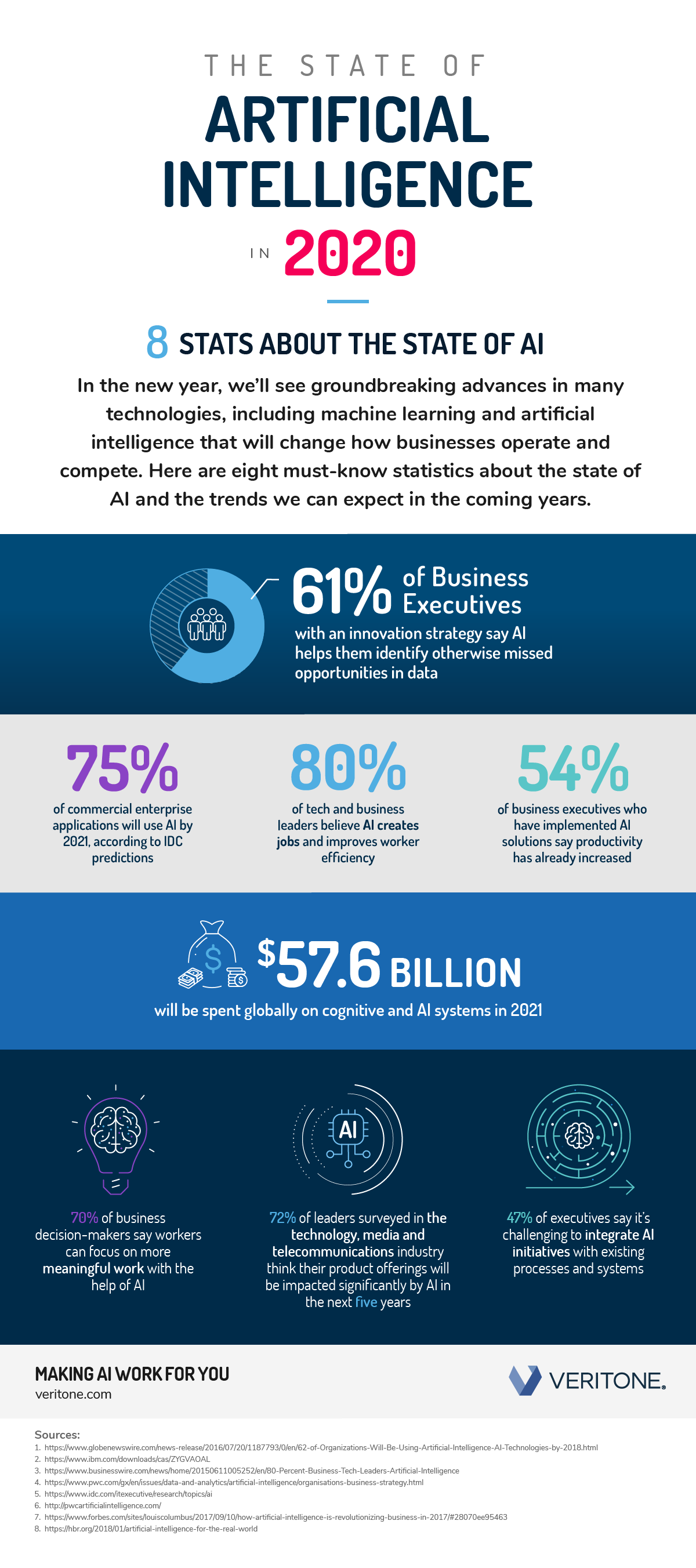
The State of Artificial Intelligence in 2020: AI by the Numbers
Artificial intelligence is changing the way companies purchase and sell B2B products. AI promises to continue to transform the way we do business and relate to the digital landscape.
Yet, discussions about AI often stir up anxieties.
Will AI impact job security? Will it become more intelligent than humans and plunge the world into an Orwellian surveillance state?
But as thought leadership on automation and intelligence expands, the business community is growing more comfortable and optimistic about the technology. Over the past few years, research has demonstrated that the AI sector will continue to face significant hurdles. The world is ready to embrace AI solutions benefits: early business adopters report higher productivity, lower costs, more creative and fulfilled teams.

8 STATISTICS ABOUT THE STATE OF AI
In the new year, we’ll see groundbreaking advances in many technologies, including machine learning and artificial intelligence that will change how businesses operate and compete. Here are eight must-know statistics about the state of AI and the trends we can expect in the coming years.
1. 61% of business executives with an innovation strategy say AI helps them identify otherwise missed opportunities in data.
When employees are expected to parse immense amounts of data to spot trends or potential mistakes, it inevitably opens the door to human error. By leveraging AI to quickly identify data opportunities, workers can focus more on contextualizing and applying data strategically.
2. 75% of commercial enterprise applications will use AI by 2021, according to IDC predictions.
It’s difficult to imagine what the world will look like in 2021 when we consider the fact that the majority of enterprises will deploy AI solutions. Adoption is growing, and in the next couple years we can expect AI to change the world and completely alter the way we interact with data.
3. 80% of tech and business leaders believe AI creates jobs and improves worker efficiency.
This idea contrasts with the commonly held belief that AI will eliminate jobs, and revolves around an ethos of working with employees to implement technology that turns technology into a partner rather than a competitor. Efficiency gains create more opportunities to be creative and spearhead new projects that require more jobs.
4. 54% of business executives who have implemented AI solutions say productivity has already increased.
This is no surprise, considering AI has the power to reduce busywork and enable workers to work better and focus on more strategic tasks. As AI improves, so too must the methods we use to gauge its ROI because current metrics discount factors like productivity and worker well-being.
5. $57.6 billion will be spent globally on cognitive and AI systems in 2021.
While AI seems like a relatively new innovation, its use is rapidly expanding and early adoption puts your company ahead of mainstream adoption. In 2019, we spent $37.5 billion on AI systems, a number expected to balloon by $20 billion in the next 2 years. By 2023, it will reach $98 billion.
6. 70% of business decision-makers say workers can focus on more meaningful work with the help of AI.
While many people assume that AI will be the technology that makes enormous breakthroughs — such as curing cancer — in reality, it’s being used mostly to complete simpler tasks so humans can devote more time to these issues. For example, AI may be better suited for preventing slip-and-falls in hospitals through video recognition, while doctors focus on treating life-threatening illnesses.
7. 72% of leaders surveyed in the technology, media and telecommunications industry think their product offerings will be impacted significantly by AI in the next five years.
Because AI accelerates the rate of innovation at organizations by freeing up worker time, we’ll also be able to offer new products at a faster rate. The crazy thing about this? We can’t even imagine what these offerings are right now.
8. 47% of executives say it’s challenging to integrate AI initiatives with existing processes and systems.
As with any new innovation or change to business as usual, companies have experienced the most problems as they try to integrate the new with the old. As AI innovations move forward, businesses must figure out more effective methods to seamlessly integrate AI with existing business processes.
As we approach the new decade and increased volumes of data threaten to dominate frontline workers’ time, the pressure is on for organizations to leverage new tools to keep up with competitors and create more efficient workflows. Staying up to date with technology advances and integrating powerful tools into your company ensures your organization stays afloat and thrives in the new decade.
Future Reading
How Avoiding Using “AI” Can Promote Acceptance
Smartphones Get Smarter as AI Chips Become Standard
aiWARE the Operation System for AI
Sources
1. 62% of Organizations Will Be Using Artificial Intelligence (AI) Technologies
3. 80 Percent of Business and Tech Leaders Say Artificial Intelligence Creates Jobs, Increases Productivity
4. How can organisations reshape business strategy with AI?
5. https://www.idc.com/itexecutive/research/topics/ai
6. How AI is pushing man and machine closer together
7. How Artificial Intelligence Is Revolutionizing Business
8. Artificial Intelligence for the Real World